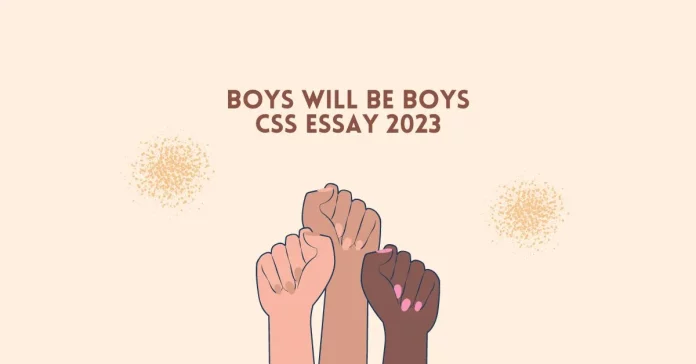Table of Contents
Thesis statement
The phrase “boys will be boys” has been used for generations to excuse problematic behavior from boys, but it reinforces harmful gender stereotypes and encourages risky and harmful behavior, and alternative approaches must be adopted to promote accountability, challenge harmful behavior, and promote healthy masculinity.
Introduction
The phrase “boys will be boys” is a common refrain used to excuse problematic behavior from boys, whether it’s physical aggression, risk-taking, or disregard for rules and authority. This phrase has been used for generations, and its origins can be traced back to the idea that boys are inherently more aggressive and prone to rule-breaking than girls. While the phrase may seem harmless, it reinforces harmful gender stereotypes and encourages risky and harmful behavior. In this essay, we will explore the effects of the phrase “boys will be boys” and discuss alternative approaches to promoting accountability, challenging harmful behavior, and promoting healthy masculinity.
Boys’ behavior and socialization
From a young age, boys are socialized to be more physically active and aggressive than girls. They are often encouraged to play sports, engage in rough-and-tumble play, and assert their dominance over others. This behavior is often reinforced by media, which portrays men as strong, dominant, and unemotional. Girls, on the other hand, are often socialized to be more nurturing, emotional, and passive.
These gender differences in behavior are not biological but are socially constructed. They are a product of cultural expectations and gender roles. Boys are taught to be tough and aggressive, while girls are taught to be nurturing and emotional. This dichotomy reinforces harmful gender stereotypes and limits the range of behaviors that boys and girls are allowed to exhibit.
Effects of the phrase “boys will be boys”
The phrase “boys will be boys” reinforces these gender stereotypes by excusing harmful behavior from boys. It implies that boys cannot help but be aggressive and that their behavior is simply a result of their gender. This excuses boys from taking responsibility for their actions and reinforces the idea that they are not accountable for their behavior.
This phrase also encourages risky and harmful behavior. Boys are often encouraged to take risks, engage in physical fights, and push boundaries. They are taught that these behaviors are a sign of masculinity and strength. This can lead to dangerous behavior, such as underage drinking, drug use, and reckless driving.
Furthermore, the phrase “boys will be boys” is often used to excuse harmful actions, such as sexual harassment, bullying, and violence. This implies that these behaviors are normal and acceptable for boys, which is a dangerous message to send.
Alternatives to “boys will be boys”
To promote accountability, challenge harmful behavior, and promote healthy masculinity, alternative approaches must be adopted. Rather than excusing harmful behavior, boys must be held accountable for their actions. They must learn that their behavior has consequences and that they are responsible for the harm they cause.
Additionally, harmful behavior must be challenged. Boys must learn that violence, bullying, and sexual harassment are not acceptable and that they will not to be excused under any circumstances. This requires a shift in cultural attitudes towards masculinity and a rejection of harmful gender stereotypes.
Finally, promoting healthy masculinity is essential to creating a culture in which boys and men can thrive. This means promoting traits such as empathy, emotional intelligence, and respect for others. It means teaching boys that vulnerability is not weakness and that asking for help is a sign of strength. By promoting healthy masculinity, we can create a culture in which boys and men are empowered to be their authentic selves.
Conclusion
The phrase “boys will be boys” has been used for generations to excuse problematic behavior from boys, but it reinforces harmful gender stereotypes and encourages risky and harmful behavior. To promote accountability, challenge harmful behavior, and promote healthy masculinity, alternative approaches must be adopted. Boys must be held accountable for their actions, harmful behavior must be challenged, and healthy masculinity must be promoted. By doing so, we can create a culture in which boys and men can thrive, and harmful gender stereotypes can be challenged. It’s time to retire the phrase “boys will be boys” and promote a culture of accountability, respect, and healthy masculinity.


